Describe a Song or a Piece of Music You Like – IELTS Speaking Part 2 & 3
11 min read
Updated On
-
Copy link
Get ready to practice the Describe a Song or a Piece of Music You Like IELTS cue card to boost preparations for your target band score. Find Part 2 model answers, follow-up Q&A, and vocabulary to help you frame your own "Describe a Song" answers.
Table of Contents
- Describe a Song or a Piece of Music You Like IELTS Speaking Part 2 Question & Sample Answers
- Vocabulary for Describe a Song or a Piece of Music You Like IELTS Cue Card
- Describe a Song or a Piece of Music You Like – IELTS Cue Card Part 3 Follow-Up Questions
- Vocabulary for Describe a Song or a Piece of Music You Like IELTS Follow-up Questions

Predicted Cue Cards Topics 2024
While answering to describe a song you like cue card and follow-up questions, you have to share your preference or opinion on music. Whether it is a song that brings back fond memories, motivates you, or simply makes you want to dance, preparing music IELTS Speaking Part 1 sample answers and Music IELTS Speaking Part 2 & 3 questions provides a perfect opportunity to express your thoughts about music's impact on your life.
In this post, you will not only learn how to prepare a cue card for IELTS Speaking on similar topics through the three IELTS cue card samples, but you will also find answers to related IELTS Speaking Part 3 questions, supported by relevant vocabulary.
Before you start, go through these tips to prepare for Part 2 of IELTS Speaking test and improve your skills and fluency in the guide below!
Describe a Song or a Piece of Music You Like IELTS Speaking Part 2 Question & Sample Answers
In the IELTS Speaking Part 2, describing a song or piece of music you like allows you to share personal experiences and emotions while showcasing your vocabulary and fluency. You will get some time to brainstorm and prepare for the given topic before you are allowed to speak during the actual exam.
Describe a song or a piece of music you like
You should say :
- What the song or music is
- What kind of song or music is it
- Where you first heard it
- And explain why you like it
Now check out the three Band 9 Sample Answers prepared by IELTS experts on the topic, Describe a song or a piece of music you like, along with vocabulary to boost your speaking preparation.
Describe a Song or a Piece of Music You Like – IELTS Cue Card Sample Answer 1
- What the song or music is
Usually, in my free time, I listen to various types of music as it helps me to destress. However, one of my all-time favorite songs is ‘Fix You’ by Coldplay. It was released in 2005 as part of their album X&Y.
- What kind of song or music is it
This song falls under the alternative rock genre, but it’s more of a soft, emotional ballad with a calming melody and powerful lyrics. The combination of the organ, guitar, and Chris Martin’s soulful voice makes it deeply moving.
- Where you first heard it
I first heard it during my college days when I was going through a difficult time. A friend of mine sent it to me, saying, "This might help”. I remember lying on my bed with my headphones on, and as the song progressed, I felt this overwhelming sense of comfort and reassurance. It has remained close to my heart ever since.
- And explain why you like it
I love this song because of its uplifting message about resilience and hope. The lyrics, "Lights will guide you home, and ignite your bones, and I will try to fix you”, resonate with me whenever I feel discouraged. The gradual build-up, from a gentle start to a powerful crescendo, feels like an emotional release every time I listen to it. It reminds me that even in the darkest times, there’s always a glimmer of hope.
Grab Our 4.5+ Rated Speaking Ebook Now to Level Up! Buy Now!
Describe a Song or a Piece of Music You Like – IELTS Cue Card Sample Answer 2
- What the song or music is
Although I am more of a classical music listener, I try to listen to different types of songs to expand my taste in music. A piece of music I deeply admire is ‘Raag Yaman’, performed by the legendary sitar virtuoso Pandit Ravi Shankar. This classical composition belongs to the Hindustani classical tradition, which has been passed down for generations in India.
- What kind of song or music is it
It is a traditional raga that evokes a sense of peace and devotion. ‘Raag Yaman’ is based on the Kalyan that is typically performed in the evening, creating a serene and contemplative atmosphere. The sitar’s intricate, flowing notes are mesmerizing, and the interplay between the melody and the rhythm feels almost meditative.
- Where you first heard it
I first heard it when I attended a classical music concert with my parents as a child. At the time, I didn’t fully understand the complexities of classical music, but I was fascinated by the sound of the sitar. Years later, I rediscovered the piece while preparing for a stressful exam. Listening to it helped calm my nerves and improved my focus.
- And explain why you like it
I love ‘Raag Yaman’ because it has a calming effect on me, no matter how anxious I feel. The way Pandit Ravi Shankar effortlessly moves between slow, meditative passages and faster, more dynamic sections demonstrates not just technical mastery but also profound emotional depth. It reminds me of the timeless beauty of Indian classical music and its ability to soothe the soul.
Describe a Song or a Piece of Music You Like – IELTS Cue Card Sample Answer 3
- What the song or music is
One of my all-time favorite songs is ‘Kal Ho Naa Ho’, sung by Sonu Nigam. It’s the title track from the 2003 Bollywood movie of the same name, starring Shah Rukh Khan.
- What kind of song or music is it
This is a Bollywood song that beautifully blends soft romantic melodies with a hint of melancholy. It belongs to the genre of Indian filmi music, which often combines classical, pop, and contemporary styles. The music was composed by Shankar-Ehsaan-Loy, and the lyrics, written by Javed Akhtar, convey a profound message about living in the moment.
- Where you first heard it
I first heard this song when I watched the movie with my family as a child. I remember being captivated by the emotional depth of the music, even though I didn’t fully understand the lyrics at the time. Later, when I revisited it as a teenager, it hit me differently—I could truly appreciate its meaning.
- And explain why you like it
I love this song because of its heartwarming message: live every moment to the fullest because tomorrow is uncertain. The lyrics, "Har pal yahan jee bhar jiyo, jo hai sama, kal ho naa ho" (Live every moment here to the fullest; this moment may not come again), remind me to appreciate life and cherish my loved ones. Sonu Nigam's soulful voice, combined with the gentle piano and violin background, creates a nostalgic and comforting feeling every time I listen to it.
Related Cue Cards
- A Song you Enjoy Listening To – IELTS Speaking Cue Card Answers
- Describe Your Favorite Singer - IELTS Speaking Part 2 & 3
- Describe an Event You Attended in Which You Didn’t Like the Music Played- IELTS Cue Card
Boost your IELTS Speaking score with expert guidance—join our online webinar now!
Vocabulary for Describe a Song or a Piece of Music You Like IELTS Cue Card
Using a rich vocabulary in IELTS Speaking Part 2 helps to clearly express ideas, enhance communication, and showcase language proficiency, which can improve your overall IELTS band score.
|
Word |
Meaning |
Example Sentence |
|---|---|---|
|
Ballad |
a long song or poem that tells a story, often about love |
The ballad of Bhanu Pratap is known to every child in this part of the country. |
|
Uplifting |
producing a feeling of hope and happiness |
Classical music can be uplifting and exciting at the same time. |
|
Build-up |
an increase of something over a period |
The build-up in his plays is well-noted by most critics as they are well-planned. |
|
Crescendo |
a noise or piece of music that gets louder and louder |
When the music reached its crescendo, they decided to leave the palace. |
|
Virtuoso |
a person who is extremely skilful at something, especially playing a musical instrument |
Her mother is a virtuoso in sitar and is quite popular. |
|
Interplay |
the way in which two or more things have an effect on each other. |
The interplay of light and shadow in these portraits are very beautiful. |
|
Resilience |
the ability to be happy, successful, etc. again after something difficult or bad has happened |
Mr. Robin’ resilience especially after his loss is motivating to a lot of people. |
|
Contemplative |
involving quiet and serious thought for a period of time |
When he becomes contemplative, we know that he will come up with something unique. |
|
Timeless |
that does not seem to be changed by time or affected by changes in fashion |
Audrey Hepburn is a timeless beauty. |
|
Melancholy |
a feeling of sadness which lasts for a long time |
Melancholy is a dominant theme in most of her poems. |
Shy to speak? Book a FREE Demo to boost your Speaking now! Sign Up!
Describe a Song or a Piece of Music You Like – IELTS Cue Card Part 3 Follow-Up Questions
In IELTS Speaking Part 3, you will be asked follow-up questions on music speaking part 2 topics like ‘describe a song you like’. Given below are the sample answers to Part 3 questions with expert-curated sample answers and vocabulary that you can use in your own responses.
1 Do you think music is an important part of our lives? Why or why not?
Music is indeed an integral part of human existence. It transcends cultural boundaries and has the power to evoke emotions, convey messages, and bring people together. Music serves various purposes, from entertainment and self-expression to cultural preservation and emotional healing. It has the ability to uplift our spirits, provide solace during difficult times, and create shared experiences that foster community and understanding.
2 What effects can music have on people’s emotions and moods?
Music has a profound impact on our emotions and moods. Certain melodies, rhythms, and lyrics can elicit specific emotional responses, such as joy, sadness, relaxation, or excitement. Upbeat and energetic music can boost our mood and increase feelings of happiness and motivation, while slower and more melancholic tunes can evoke a sense of introspection or melancholy. Music has the power to transport us to different emotional states and can be used as a therapeutic tool for managing stress, anxiety, and depression.
3 Do you think the popularity of certain types of music changes over time? Why is that?
Yes, the popularity of certain genres and styles of music tends to change over time. This can be attributed to several factors, including cultural shifts, technological advancements, and the influence of social movements. As societies evolve and new generations emerge, their tastes and preferences in music often reflect their values, experiences, and the zeitgeist of their era. Additionally, the introduction of new recording technologies and distribution platforms can contribute to the rise or decline of particular genres. Social and political movements can also shape the popularity of certain types of music, as artists use their music as a vehicle for expressing their beliefs and connecting with audiences who share similar values.
4 What role do you think music plays in preserving cultural traditions?
Music plays a crucial role in preserving cultural traditions and heritage. Many cultures have a rich tapestry of traditional music, which serves as a repository of stories, histories, and values passed down through generations. Traditional music often incorporates elements of language, instrumentation, and performance styles that are unique to a particular culture. By preserving and promoting traditional music, communities can maintain a connection to their roots, celebrate their identity, and ensure the continuity of their cultural heritage. Additionally, music can be a powerful medium for educating younger generations about their cultural traditions and fostering a sense of pride and belonging.
5 Do you think music education should be a priority in schools? Why or why not?
Music education should definitely be a priority in schools for several reasons. First, exposure to music and music education can have cognitive benefits for students, enhancing their skills in areas such as memory, concentration, and language development. Second, music education fosters creativity, self-expression, and an appreciation for the arts, which are essential for well-rounded personal growth. Third, it provides students with an opportunity to develop discipline, teamwork, and performance skills, which are valuable in various aspects of life. Additionally, music education can promote cultural awareness and understanding by introducing students to diverse musical traditions from around the world. By making music education a priority, schools can nurture the development of well-rounded individuals and contribute to the preservation and appreciation of cultural heritage.
Additional Practice Questions Related to Music IELTS Speaking Part 3
Have a look at a few more follow-up questions related to Describe a Song or a Piece of Music You Like cue card and take up for practice to check your level of preparation.
- What kinds of music are popular with young people in your culture?
- What do you think influences a young person’s taste in music?
- How has technology affected the kinds of music popular with young people?
- Tell me about any traditional music in your culture.
- How important is it for a culture to have musical traditions?
- Why do you think countries have national anthems or songs?
Need speaking practice? Join our online IELTS classes and improve your fluency and coherence!
Vocabulary for Describe a Song or a Piece of Music You Like IELTS Follow-up Questions
Here are the latest IELTS Speaking vocabulary to boost your score for Part 3 follow-up questions on ‘Describe a song or piece of music you like’ with examples.
- Transcends (v.): To go beyond or rise above, to surpass.
Example: Music transcends cultural boundaries and has the power to bring people together. - Solace (n.): Comfort or consolation in times of distress or sadness.
Example: Music can provide solace during difficult times in our lives. - Therapeutic (adj.): Relating to the healing of physical or mental disorders, having a beneficial effect.
Example: Music can be used as a therapeutic tool for managing stress and anxiety. - Zeitgeist (n.): The defining spirit or mood of a particular period of history as shown by the ideas and beliefs of the time.
Example: The popularity of certain types of music often reflects the zeitgeist of a particular era. - Repository (n.): A place where things are stored or preserved.
Example: Traditional music serves as a repository of stories, histories, and values of a culture. - Continuity (n.): The state of being continuous or uninterrupted.
Example: Preserving traditional music ensures the continuity of cultural heritage. - Cognitive (adj.): Relating to the mental process of acquiring knowledge and understanding through thought, experience, and the senses.
Example: Music education can have cognitive benefits for students, enhancing their memory and concentration. - Well-rounded (adj.): Having a broad range of skills, knowledge, or experience.
Example: Music education fosters the development of well-rounded individuals. - Nurture (v.): To care for and encourage the growth or development of.
Example: By making music education a priority, schools can nurture the personal growth of students. - Preservation (n.): The act of protecting or maintaining something from being damaged, lost, or destroyed.
Example: Music education contributes to the preservation and appreciation of cultural heritage.
To sum up, music being a universal language, has the power to uplift, comfort, and connect people across the world. So, when you are answering cue card topics like Describe a Song or a Piece of Music You Like, make sure to share your personal experiences and use relevant vocabulary to achieve band score of 8+.
Also Check:
- Recent IELTS Topics in IELTS Speaking Tests 2025
- What to do if you forget what to say during a Speaking Test?
- IELTS Speaking Vocabulary - 30 Academic Words that will Help you Score IELTS Band 9 (Part 1)
- How to Express Your Mixed Feelings in IELTS Writing & Speaking?
- Self-Introduction for IELTS Speaking Test: A Complete Guide
- 5 Best Podcasts for English Learners
- How to Organize Your Responses on the IELTS Speaking Exam?

Top 10 IELTS Cue Cards + Band 9 Answers
Explore other Cue Cards
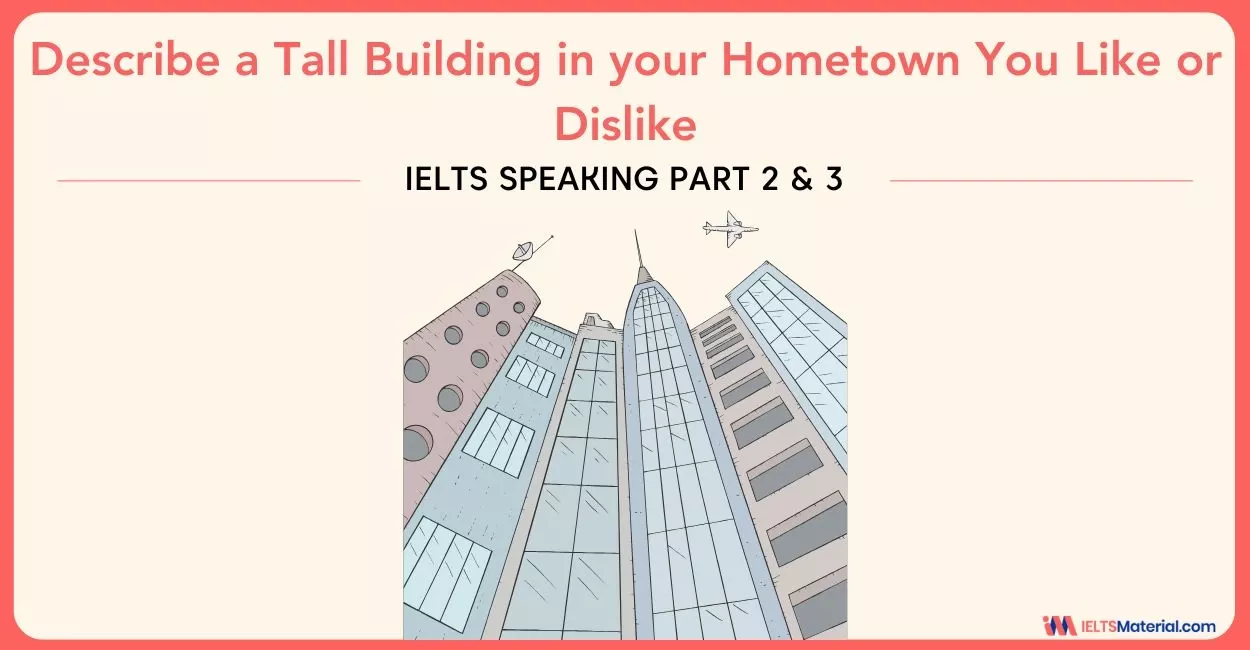
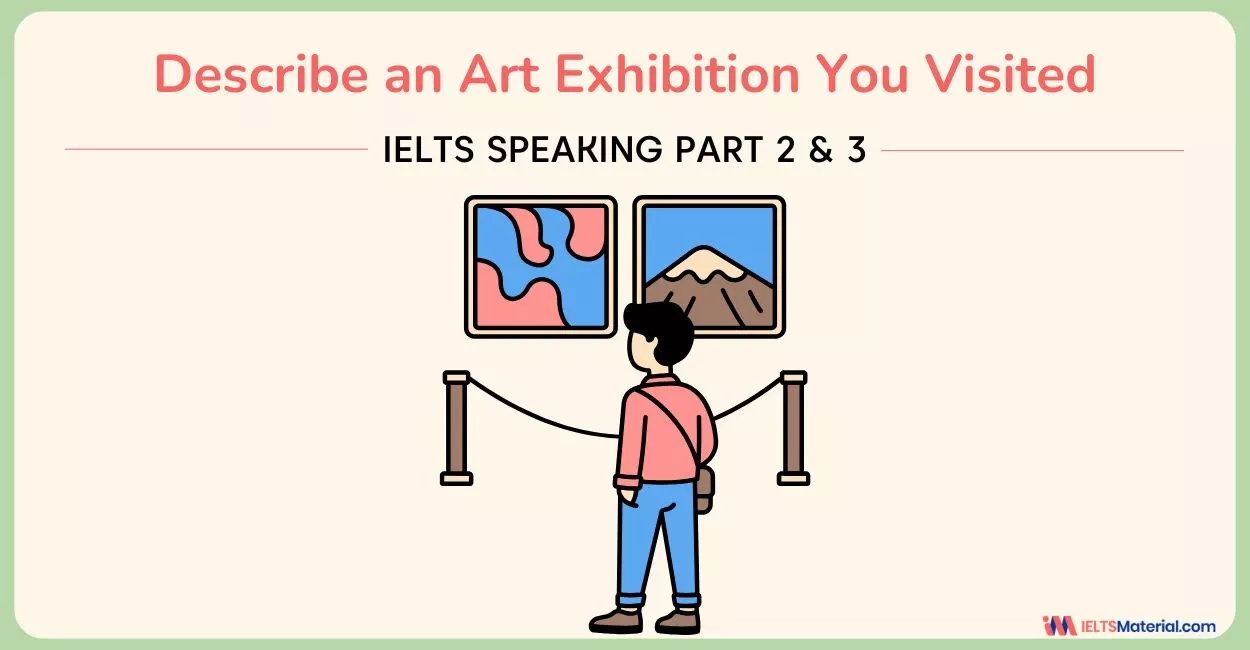
Kasturika Samanta
Recent Articles

Haniya Yashfeen
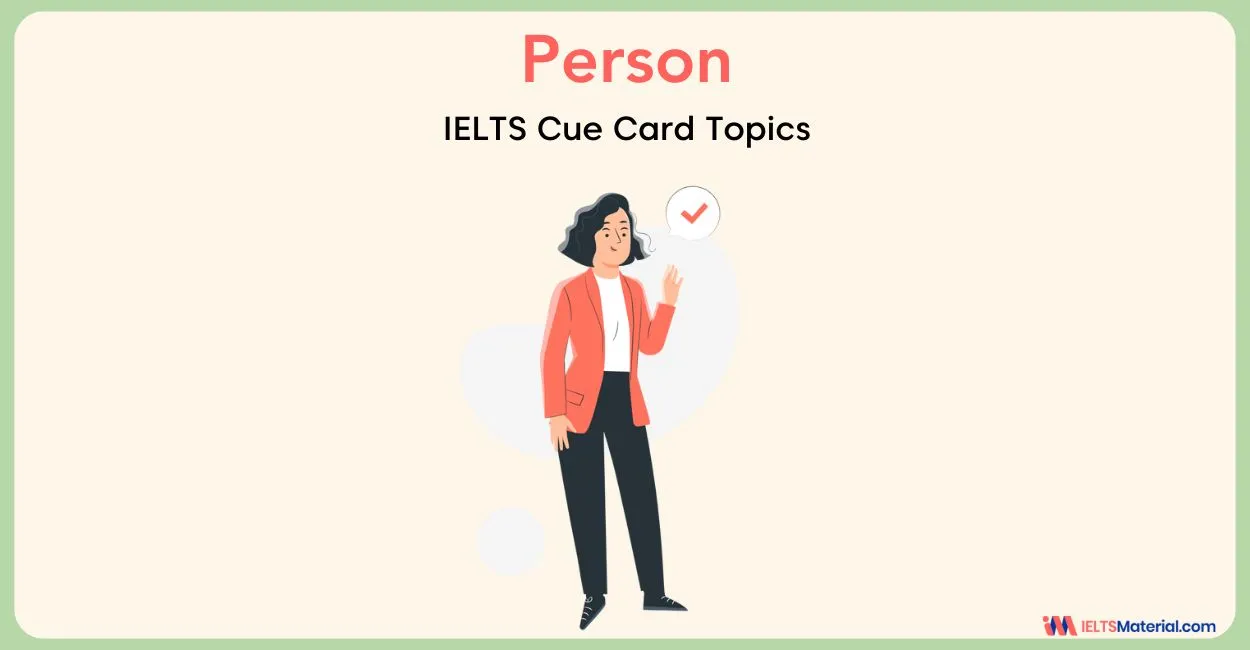
Kasturika Samanta

Nehasri Ravishenbagam
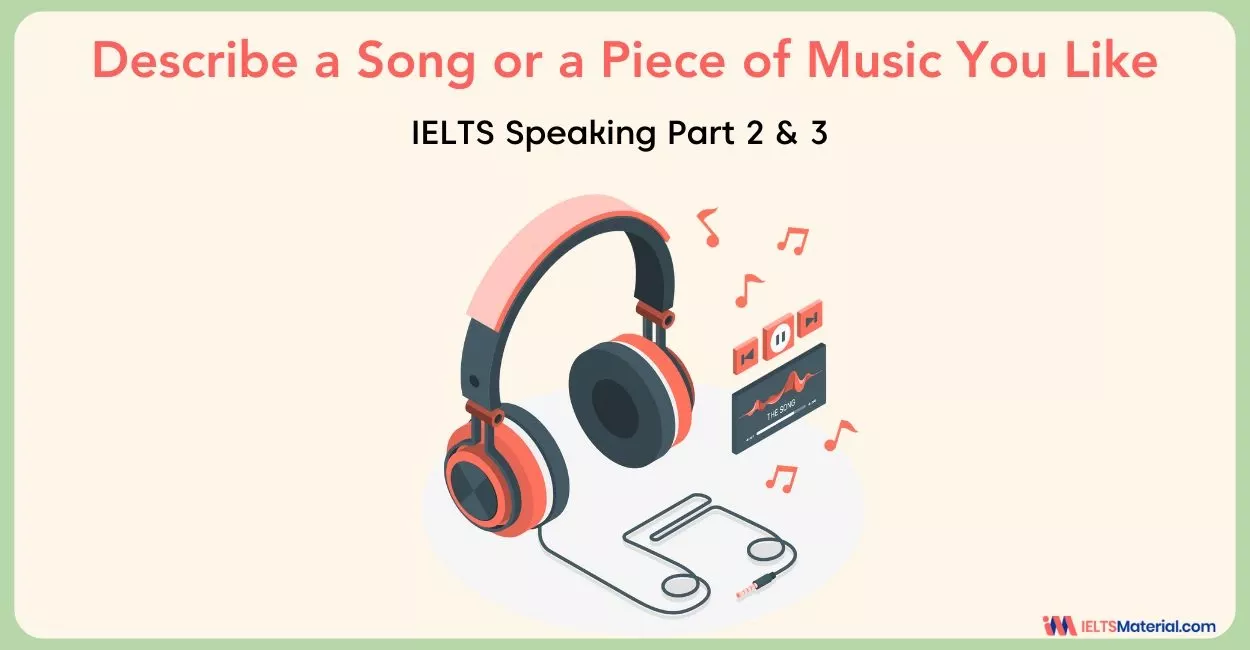



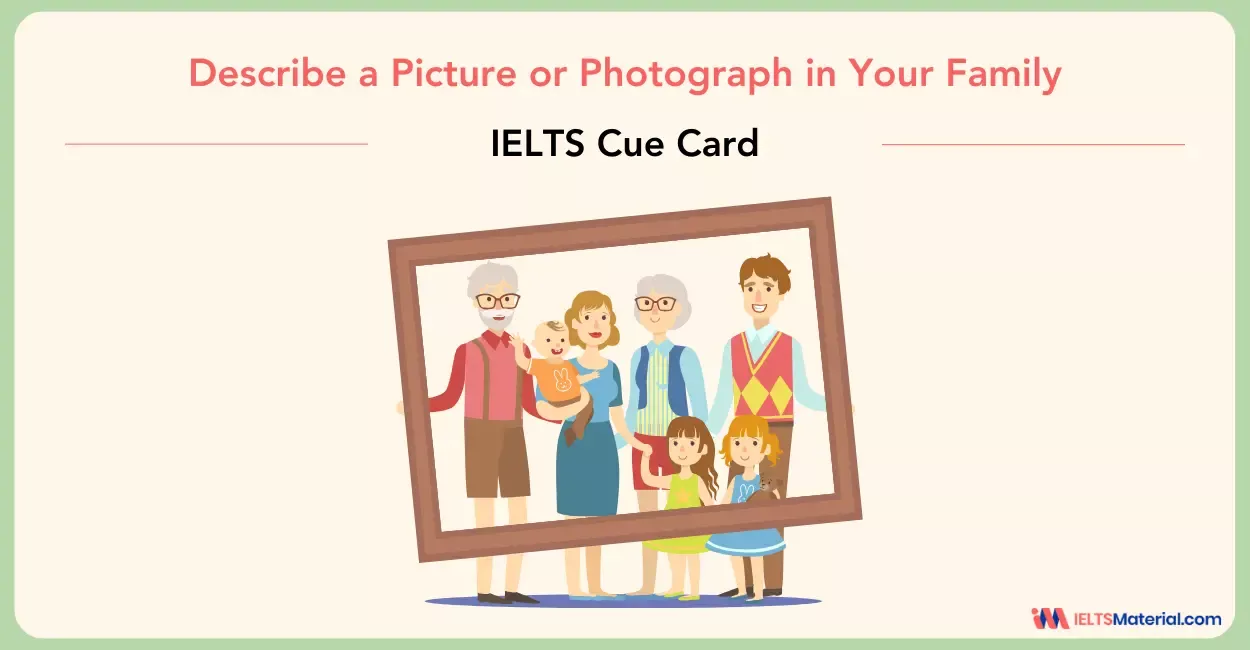


Post your Comments
3 Comments